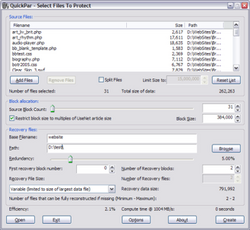QuickPar: Difference between revisions
→"Could not allocate output buffer": we're not a how-to guide |
→See also: remove redlinks (which clears the section) |
||
| Line 68: | Line 68: | ||
Some users received the error "Failed: Could not allocate output buffer". The developer writes, "Having too much memory available could potentially be a problem if you are creating a large output set as QuickPar will attempt to allocate a large chunk of that memory to do allow it to create the entire set of output data in one go. If windows then refuses to allocate such a large chunk of memory, QuickPar will fail with the "could not allocate output buffer" error." [http://www.quickpar.org.uk/forum/viewtopic.php?id=1042] As version 0.9.1, this bug has not been fixed [http://www.quickpar.org.uk/forum/viewtopic.php?pid=5579#p5579]. |
Some users received the error "Failed: Could not allocate output buffer". The developer writes, "Having too much memory available could potentially be a problem if you are creating a large output set as QuickPar will attempt to allocate a large chunk of that memory to do allow it to create the entire set of output data in one go. If windows then refuses to allocate such a large chunk of memory, QuickPar will fail with the "could not allocate output buffer" error." [http://www.quickpar.org.uk/forum/viewtopic.php?id=1042] As version 0.9.1, this bug has not been fixed [http://www.quickpar.org.uk/forum/viewtopic.php?pid=5579#p5579]. |
||
==See also== |
|||
*[[MultiPar]] |
|||
*[[Par2MultiChecker]] |
|||
==References== |
==References== |
||
Revision as of 02:20, 2 June 2012
 QuickPar 0.9 checking a series of RAR files for integrity. | |
| Developer(s) | Peter Clements |
|---|---|
| Initial release | 0.1, (February 5, 2003)[1] |
| Stable release | 0.9.1
/ July 4, 2004[2] |
| Operating system | Microsoft Windows |
| Platform | x86 |
| Type | Data recovery |
| License | Proprietary, Freeware |
| Website | www.quickpar.org.uk |
QuickPar is a computer program that creates parchives used as verification and recovery information for a file or group of files, and uses the recovery information, if available, to attempt to reconstruct the originals from the damaged files and the PAR volumes.
Designed for the Microsoft Windows operating system, it is often used to recover damaged or missing files that have been downloaded through Usenet.[3] QuickPar may also be used under Linux via Wine.[4]
There are two main versions of PAR files: PAR and PAR2. The PAR2 file format lifts many of its previous restrictions.[5]QuickPar is freeware but not open source. It uses the Reed-Solomon error correction algorithm internally to create the error correcting information.

Recurse subfolders
QuickPar is unable to recurse subfolders so it can only make a single parchive for the files in one folder. MultiPar is purportedly able to recurse subfolders [1][2], although one user warns that "phpar2 also has problems with large amounts of data" on 2009-06-17 [3] (see "Could not allocate output buffer").
"Could not allocate output buffer"
Some users received the error "Failed: Could not allocate output buffer". The developer writes, "Having too much memory available could potentially be a problem if you are creating a large output set as QuickPar will attempt to allocate a large chunk of that memory to do allow it to create the entire set of output data in one go. If windows then refuses to allocate such a large chunk of memory, QuickPar will fail with the "could not allocate output buffer" error." [4] As version 0.9.1, this bug has not been fixed [5].
References
- ^ "QuickPar - Old Release Notes". Retrieved 2010-11-19.
- ^ "QuickPar for Windows". Retrieved 2009-09-27.
- ^ Wang, Wallace (2004-10-25). "Finding movies (or TV shows): Recovering missing RAR files with PAR and PAR2 files". Steal this File Sharing Book (1st ed.). San Francisco, California: No Starch Press. pp. 164 – , 167. ISBN 1-59327-050-X. Retrieved 2009-09-24.
- ^ Petersen, Richard (2009-05-01). "Internet Applications". Ubuntu 9.04 Desktop Handbook. Los Angeles, California: Surfing Turtle Press. p. 224. ISBN 0-9820998-4-3. Retrieved 2009-09-27.
- ^ "QuickPar - About PAR2". Retrieved 2009-09-27.
